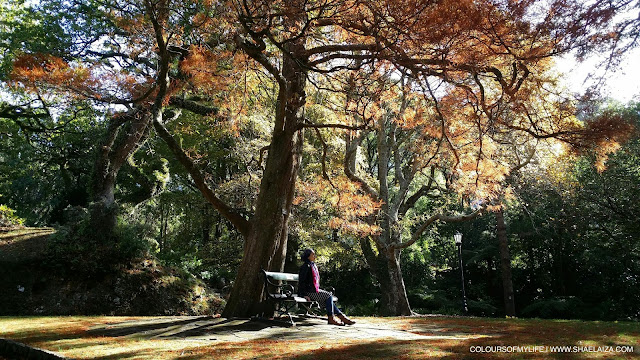My Muslim Identity Crisis (Part II)
 |
| Wellington Botanic Gardens, May 2016 |
Four years ago, I published a post entitled 'My Muslim Identity Crisis' and the response I received was beyond my expectations. Looking back, I can see how much I've grown, although if I were to be completely honest, I am still trying to make sense of my Muslim/Malay/Kiwi identity today. What I know for sure is not knowing the answers all the time is part of being human and quite possibly the reason why life is beautiful.
I was first intrigued by identity politics when I read Ulrich Beck and Elisabeth Beck-Gernsheim's theory of individualisation. The theory argues the quest to construct our individual identities is a paradoxical process because the more we try to liberate ourselves from social expectations and social constructs the more we become bounded by other ones. For example, the moment we think we are detaching ourselves from cultural and traditional notions and norms of gender roles we are actually ascribing to another culture's set of socially-constructed expectations.
When we shed one identity we are left with the task of creating or searching for another one. The very thing we think might liberate us, such as the freedom to be individuals and choose who we want to be and how we want to live our lives, might actually bind us even more to socially constructed ideas. Our desire to belong to a community of our choice means we are likely to adjust to that particular community's standards of what is normal and acceptable. This is not to say that there's something inherently wrong with the desire for individuality or a sense of belonging in a community but we must be critical of it and the process of individualisation.
"Individualization is a compulsion, albeit a paradoxical one, to create, to stage manage, not only one’s own biography but the bonds and networks surrounding it and to do this amid changing preferences and at successive stages of life. The more the range of options widens and the necessity of deciding between them grows, the more individuals have to perform tasks of biographical adjustment, co-ordination, integration. If they are not to fail, men and women must be able to plan for the long term and adapt to change.
They must organise and improvise, set goals, recognise obstacles, accept defeats and attempt new starts. And the less stable the ground, the more insistent the imperative – from school to sports, from job performance to house hunting to finding the cheapest loans: Make your own way! Keep going, try harder! Keep pushing or you’ll never get to the top! So beyond the new options and opportunities, there are also new demands, compulsions, constrains inherent in the process of individualization. And with advancing globalisation the latter are growing ever more powerful. The demands coming up now do not only affect the biography of the individual but also reach deep into our social lives, producing new standards for relationships, the desire for children, everyday family life." (Beck-Gernsheim, 'Interview with Elisabeth Beck-Gernsheim on Individualization')
I believe this is one of the conundrums we face as millenials, especially among us young Muslims who are trying to make sense of our cultural identities, our faith and the society we live in, which seems to be at odds with our faith. It requires a lot of effort to navigate ourselves in a world defined by globalisation, "the intensification of worldwide social relations which link distant localities in such a way that local happenings are shaped by events occurring many miles away and vice versa" (Giddens, 1990).
"Globalization involves the diffusion of ideas, practices and technologies. It is something more than internationalization and universalization. It isn’t simply modernization or westernisation." (Globalization: Theory and Practice)
As individuals and millenials we question our cultural and/or religious identities and how they help us to fit into a society or break away from a monocultural society. I personally struggle with this a lot because it often leads to cognitive dissonance but it could be because I'm consciously trying to reconcile various aspects of my identity instead of embracing, enjoying and making meaning out of it. In the book 'Islam and Secularism', Professor Naquib al-Attas discusses the phenomenon of the identity crisis which is common in 'the West' (and now becoming more prevalent in Eastern societies too). He wrote,
"The three generations (youth, middle-aged and old) that in such wise comprise Western society are forever engaged in the search for identity and meaning of life are forever moving in the vicious circle of unattainment; each generation dissatisfied with its own self-evolved values of life each generation finding itself a misfit... the Islamic society is not beset by such condition. The individuals within the generations that comprise it, whether male or female, have already established their identity and recognised their ultimate destiny; the former through recognition and confirmation of the Covenant, and the latter through affirmation and realisation of that Covenant by means of sincere submission to God's will and obedience to His Law as enacted as Islam". (al-Attas, 'Islam and Secularism', 94).
However, I would argue that it is not necessarily the 'Western' society that is affected by the phenomenon of the identity crisis but rather, the secular society, which happens to be more widespread in 'the West' (but other parts of the world are catching up!). Al-Attas explains, "the term secular, from the Latin saeculum, conveys a meaning with the marked dual connotation of time and location; the time referring to the 'now' or 'present' sense of it, and the location to the 'world' or worldly' sense of it" (16). The secular society is not only characterised by the separation of religion from the state but also rooted in the idea of life as being limited to this present world only.
Comments